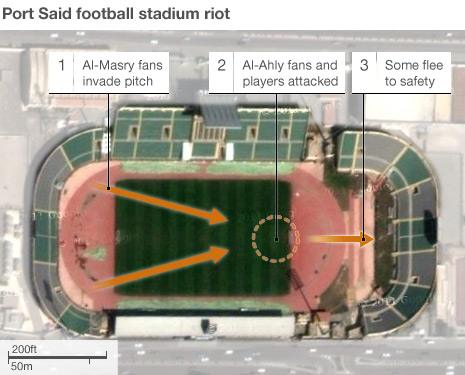Egypt football riot: Port Said officials sacked
- Published
Footage showed debris, shoes and clothes abandoned inside the stadium
Senior officials in the Egyptian city of Port Said and the Egyptian football association have been sacked in the wake of riots on Wednesday at a football match in which 74 people died.
The governor of Port Said resigned, while two senior security officials have been suspended and are in custody.
Security forces fired tear gas as thousands of protesters marched towards the interior ministry in Cairo.
Three days of national mourning have been declared.
Protesters in Cairo chanted slogans against the police and Egypt's military rulers.
As the marchers neared the interior ministry, which is protected by barricades, police fired tear gas.
Some protesters fell to the ground as they ran from the tear gas, the AP news agency reports.
Medics told the AFP news agency about 20 people were injured after inhaling tear gas.
'Work of the devil'
The riot began when fans invaded the pitch after a football match involving top Cairo club al-Ahly and the Port Said side al-Masry.
The head of Egypt's football association has been sacked and the board dissolved, with its members referred to prosecutors for questioning, Prime Minister Kamal al-Ganzouri told an emergency session of parliament.
Port Said's director of security and the head of investigations were suspended and are now in custody, Mr Ghanzouri said.
After the session, protesters blockaded the lower chamber and refused to let MPs leave, a private TV channel reported.
"Protesters shut the doors of the People's Assembly [parliament's lower chamber] and refused to let MPs leave" after the session, reported Misr 25 TV, which is sympathetic to the Muslim Brotherhood, the largest party in parliament.
The session opened with a minute's silence. Speaker Mohamed Saad al-Katatni said the riots were the "work of the devil" and that Egypt's revolution was "in danger".
Egypt's public prosecutor has ordered the questioning of 52 people arrested after the riots. The governor of Port Said and the head of security are also to be questioned.
Funerals of five of the victims took place in Port Said after noon (10:00 GMT) prayers.
All Egyptian premier-league matches have been postponed indefinitely.
The Confederation of African Football said a minute's silence would be held at the quarter-final matches of the African Cup of Nations at the weekend.
World football body Fifa said it was "in mourning" and had asked Egypt for a full report on the incidents.
'Rage in their eyes'
Demonstrators, many of them al-Ahly supporters known as Ultras, used metal barriers and vehicles to close Tahrir Square, the scene of huge protests last year which led to the overthrow of President Hosni Mubarak.
Others are marching from the club's headquarters towards the interior ministry.
The BBC's Jon Leyne in Cairo says there is a mood of extreme bitterness. Many supporters believe police were incompetent, or actively provoked the unrest.
"People are really angry, you could see the rage in their eyes," al-Ahly supporter Mohammed Abdel Hamid told the BBC.
Our correspondent says Egyptian fans are notoriously violent, particularly the Ultras.
They have been heavily implicated in confronting the police during recent political protests, he adds, and there is speculation that the security forces may have had an interest in taking them on.
"They said to us, we have brought your funeral shrouds with us. And then we were attacked horribly," another al-Ahly fan, Mohamed Saeed Mohamed Ali told Reuters.
"We went to the tunnel and the doors were shut with chains, that was the first thing, and the lights were shut off. They were firing rubber bullets... There was a young man named Islam, 17 years old, who was standing next to me and then suddenly he was lying with a skewer in his head, and his eye was blown out of the other side of his head."
Police in Egypt have been keeping a much lower profile since last year's popular protests.
Meanwhile, the Muslim Brotherhood - which has emerged as Egypt's biggest party in recent elections - blamed supporters of ousted President Hosni Mubarak for the violence.
As the match ended, people flooded onto the pitch attacking al-Ahly players and fans. Witnesses said the atmosphere had been tense throughout the match.
Field Marshal Hussein Tantawi, the head of Egypt's ruling army council, went to an airbase near Cairo to meet al-Ahly players who were flown back from Port Said on a military aircraft.
